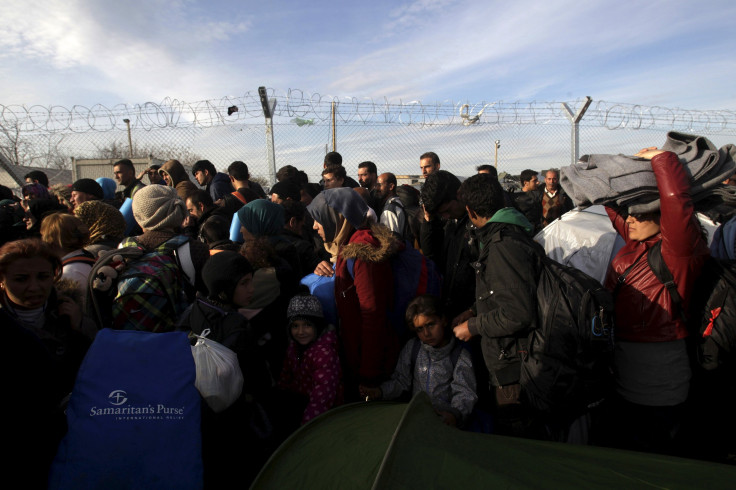European Refugee Crisis: As More People Flow From Turkey, Greece Becomes Even More Crowded

With a European Union and Turkey summit scheduled Monday, 13,000 refugees fleeing their homelands in the Middle East are stuck in unhygienic camps in Greece, most with few options of where to go since Macedonia has severly limited its allowable influx. A Greek governor in the northern region has called for a state of emergency, causing serious tensions throughout Europe.
Following the example of Austria, Macedonia restricted crossings at the border it shares with Greece to allow only a small number of refugees through, even though they continue to gather at the crossing point, the Economist reported. Now 30,000 refugees from countries such as Syria and Iraq have crammed themselves into the country, unable to get out, and with aid agencies projecting 200,000 more to arrive this month, overcrowding will only get worse.
With more and more people coming into Greece from Turkey, measures have been devised to stymie that increase. NATO had planned to use electronic tracking devices to find boats between the countries smuggling people in illegally, but by the end of February most boats were still at port.
Under a deal set to be signed Monday, non-Syrians who are economic migrants, not refugees escaping war-torn countries, who land in Greece would be sent back to Turkey, the Daily Mail reported. There are skeptics, however, who do not think the plan would help stop migrants from coming to Greece’s shores.
U.K. Independent Party politician and European Parliament member Diane James said, “This silly scheme will not work because the immigrants will just rip up their papers to avoid being sent back home,” the Mail reported.
Refugee arrivals on Thursday - 2,569 into Greece; 269 out (UNHCR). Do the math.. #migrantcrisis pic.twitter.com/naOlMIHrj3
— Piers Scholfield (@inglesi) March 4, 2016
One of the greatest concerns in Greece is the 13,000 refugees stuck in severely unhygienic conditions. For people sleeping in ditches and muddy fields, Doctors Without Borders has begun setting up additional tents, Agence France-Presse reported Saturday.
Apostolos Tzitzikostas, governor of Greece's central Macedonia prefecture, said: "We can no longer shoulder this strain by ourselves," AFP reported.
Tzitzikostas called for a state of emergency Saturday in an attempt to get aid supplies to help deal with the crisis, the BBC reported. “The European Union needs to implement severe action against the countries that are closing borders today, whether they are members of the European Union or candidate members,” he said.
Every day, 2,000 refugees register in Greece. This year alone, 125,000 have arrived there, and only some have been able to depart.
Many are trying to get to the northern European states, with a large portion seeking to get to Germany. Many have complained of the poor conditions while waiting to travel out of Greece, including scant amounts of food and suffering from illnesses, Voice of America reported.
One refugee in the camps, identified only as Abdul, said his wife is expecting a third child imminently. He said he and his family moved because there are no members of his family left in his home country of Syria and that he is left with his wife, his son and his daughter.
"Where are we meant go? What are we meant do?” he said to VOA.
“There is no future there,” he said of his home country.
Human Rights Watch has said the EU has failed to collectively respond to refugees flooding its borders. European Council President Donald Trusk has said Greece needs support, while German Chancellor Angela Merkel has said all of Europe has to work together to deal with the inflows, the Guardian reported.
#Germany's Merkel urges #Greece to step up refugee assistance. https://t.co/9HSO958KrS
— Holger Zschaepitz (@Schuldensuehner) March 5, 2016
Reports of violence involving refugees have swept Europe, including some alleging that neo-Nazis attacked refugees at a Stockholm train station, the Daily Mail reported. After a woman who worked at a refugee center was stabbed to death in January, officials called for more security at the centers.
© Copyright IBTimes 2024. All rights reserved.





















